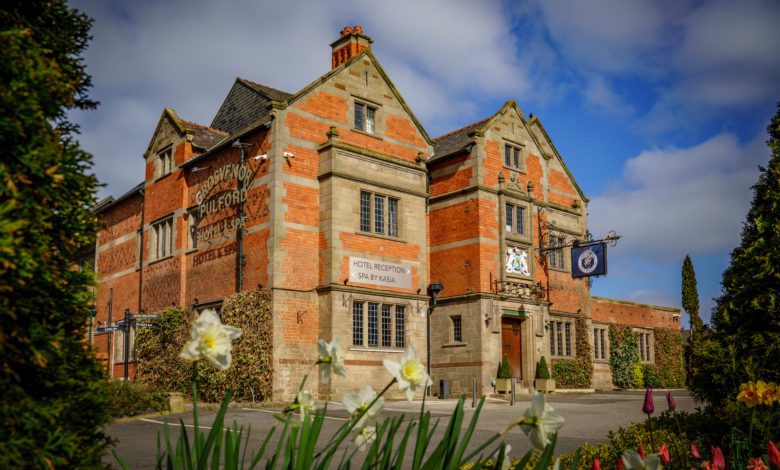Andrew Nelson: ‘frightening and completely unsustainable’
Director of Nelson Hotels and Inns, Andrew Nelson, tells us about his experience with the current energy price hikes and the cost of living as a hotelier, as well as what he’s doing to weather the storm

Can you tell us a bit about your career in hospitality?
I started off doing a managing degree at the University of Manchester and then went on to do a masters in hospitality at the hôtelière de Lausanne in Switzerland. After I finished my studies, I went on to work at the Park Hyatt, then Paris, and came back home to work as a F&B (food and beverage) manager. I didn’t start working for the family company until 2004, but I had worked previously, having grown up surrounded by hotels from a young age.
What are your day-to-day responsibilities as director of the group?
My responsibility as the director of the group is to ensure that all operations run smoothly across the company. We have five sites and a payroll of over 270 employees now. My position is a little bit like the oil in the engine; it can be all sorts of all-encompassing duties, from dealing with day-to-day operational matters to servicing the new sites and our new development.
What changes in the business have you experienced in the last year with the soaring energy costs?
It’s just been extremely difficult in hospitality. We’ve been hit from all angles; from Covid, from the effects of Brexit on our recruitment and employee pool, and now from the utilities, as well as the effects of inflation. It’s just been constant. Obviously, it’s not just us who have been experiencing the effects of utility costs, but also all our suppliers, and in turn, the inflationary effects of all our products that we’re buying. All of our utility contracts actually came to an end in September of this year, so we’ve been trying to renew our energy contracts.
We went into tender at a time when prices came back to sort of 50p per kilowatt, and we thought to ourselves, “Oh my gosh, we can’t pay that. That’s ridiculous”, and our utility provider at the time said, “Well, let’s hold off another month, it might get better”. So we said, “Okay, no problem”, and we held off until around June or July when we went again to do a price test on the market. It went up again to 58p per kilowatt. I said again, “I can’t ever pay that, that’s really bad”, and they said again, “Well, hopefully hold off another month and it might go down to a more reasonable price”. We waited until August to ask what the going rate was and they came with 80p per kilowatt, and we thought to ourselves, “We’re out of business now”. The following price test in September gave us a quote of 90p per kilowatt. On electricity alone this would have been a 587% increase – and gas was even worse, which experienced a 1,200% increase! It was frightening and completely unsustainable.
We’re a strong company with good operating profits, but those costs alone would have completely swamped any profit we’ve ever made in the past. All of this came at a point when the government didn’t really know what they were doing and didn’t know what sort of support there would be. And so, we actually started looking into alternative contracts, because typically, we’ve always signed into a 12-month or 24, or 36-month fixed contract where you pay a fixed rate to a regular supplier like Scottish Power or British Gas. What we’ve done differently this time is we’ve looked at alternative contracts, flexible contracts, whereby rather than having a fixed price, you buy on the next day ahead at the auction price of electricity. On top of that, there’s a small management fee and the non-commodity charges, which all pass through. Currently, the government has provided a support bracket of up to 21p per kilowatt hour on the wholesale price, which means that if the price goes above that, they subsidise it. If you’re in a fixed contract, you’re going to be on a fixed price no matter what, and so the government will only support the wholesale price if it goes above that. Currently on the next day auction prices of electricity trading is below that, so in the sort of contract I’ve gone into now, we’re actually doing better than the government support pack. This strategy is working in our favour at the moment, though the only thing that didn’t work was the fact that our decision was so last minute.
As the group’s overall energy costs are expected to rise by 135%, what is your strategy to handle it and what do you suppose others should do?
That’s the worst case scenario at the moment, but hopefully with our strategy of working with these flexible contracts, we can do better than that. This flexible contract strategy is what we’ve implemented for the next six months and the government’s support scheme is only going to be available for six months. If we were to agree on a fixed contract for 12 months at 90p per kilowatt hour with Scottish Power, what happens after six months? No one knows and the government might not have any further support, which will leave us paying 90p per kilowatt.
As a strategy for after these next six months, what we’d like to do is rather than buy the next day ahead, we will look for lower prices in the market and buy or hedge by a proportion of our electricity going forward. Something I learned in this process is that the best time to buy electricity is April. Since we’re going into winter now, you don’t know whether you will have a cold winter or a warm winter, so a lot of utility companies are factoring an aspect of risk within the price in case of a cold season. That pushes up the price, whereas come February, March, and April time, as you’re coming out of winter, you’d have milder gas prices. Gas storage levels could be at a high, and so the price can soften quite considerably. Going forward, February, March, April or May is the best time to look at buying utilities.
As many venues are fearing closures, in your opinion what is the key to their survival and how can they keep doors open during the winter season?
The key to surviving the winter season is keeping on top of costs and overheads. The biggest one is also wages; it’s been like a bidding war across the industry as we’ve all faced recruitment issues, so salaries have just gone up and up and up, and there’s only the same pool of staff that everyone’s bidding for. Right now, it’s about trying to keep on top of the wages and the overheads to ensure the business remains profitable.
In order to keep on top of costs, we’re having to be really frugal with our spending. We’re looking at reducing utilities and being real conscious on how we can save for our business on electricity and gas by reducing operating plant machinery times down, as one example. We’ve also dropped the temperature of the pool by a degree, still within acceptable levels, but we’re doing little things like that across all aspects of the business to make sure we’re not wasting energy. However, it’s not easy within hotels because guests are coming for an experience and guests don’t want to dine in a cold restaurant with a coat on. They don’t want to look up at a chandelier with 50 bulbs with every other one off, it just doesn’t look right. It is tricky, but we’re doing the best we can to ensure we do keep costs at a minimum.
Does Nelson Hotels and Inns have any future plans you can tell us about?
At the moment, we are busy working on a new website, so that will hopefully be up and running this winter. We have also taken on a new F&B director, Neil Armstrong, to help with overseeing the group and bring another level of support going forward.
We will look to carry on developing and expanding, but we’ve never gone too far. We’ve always done it carefully without overborrowing and taking everything step by step. We’re quite risk averse in terms of that.









